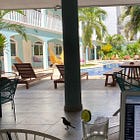FAQs
Thinking about remote work or a location-independent lifestyle in midlife comes with a mix of excitement and big questions.
Maybe you're wondering how to pivot careers without starting over, whether you’re really cut out for freelance life, or how to navigate the emotional and logistical challenges that come with such a major transition.
We’ve gathered the most common (and important) questions we hear from people like you: mid-career professionals, creatives, and thoughtful adventurers exploring what freedom looks like now.
If you don’t see your question here or want to talk more about your situation, we’d love to hear from you. Email us at hello@midlifenomads.com or connect with others on the journey in our Midlife Nomads - Work From Anywhere ✈️ community on Facebook.
How do I make a midlife career change to remote work or a remote business?
Making a midlife career shift into remote work or launching a remote-friendly business starts by identifying your strongest, most transferable skills. You don’t need to start from scratch; instead, look at how your existing expertise maps to today’s most common remote roles—things like project management, consulting, client services, product development, or content strategy.
Our 10-Day Skills-to-Income Challenge is a great place to start:
The key is not to wait until everything is perfect—take one step, learn, and iterate from there. Join our Midlife Nomads - Work From Anywhere ✈️ community (it’s completely free) to meet others on this same journey.
What are the benefits and challenges of becoming an independent consultant or solopreneur?
The biggest benefit of going independent in midlife is autonomy. You set your schedule, choose who you work with, and often earn more for doing work you actually enjoy. You can focus on niche areas where your experience adds real value, whether that's strategic consulting, training, coaching, or a specialized service. Plus, you’re not limited by geography—you can work with clients anywhere.
But this path isn’t without its challenges. Many solopreneurs face inconsistent income, especially early on, and the need to juggle multiple roles—from marketing to admin to client service. Without traditional employee benefits like health insurance or a development budget, you're responsible for building your own safety net.
There's also the mental load of navigating uncertain cash flow or client churn. For those prepared to build solid systems and stay proactive about professional development, though, this path can lead to deep satisfaction and sustainable freedom.
Related:
Am I good enough to launch my own remote consulting or freelance business?
If you're asking this question, you're not alone—and the short answer is yes, you probably are. Self-doubt is incredibly common, especially in midlife when we’re navigating big transitions. But being ready to consult or freelance remotely isn’t about having it all figured out. It’s about having skills that solve real problems and being willing to show up professionally.
Start by identifying what people already ask you for help with. Package that into a clear, outcome-focused offer. You don’t need a fancy website on day one—just a simple way to communicate who you help, what you do, and how to get in touch.
Build a small portfolio, even if it includes volunteer or side projects. Ask for testimonials. The first client is often the hardest; after that, momentum builds. Confidence grows not by waiting to feel ready, but by taking small, courageous actions before you're fully sure.
How do I navigate a career shift when my identity is so tied to what I’ve always done?
For many people in midlife, career identity isn’t just about a title or paycheck—it’s about legacy, purpose, and the roles we’ve come to define ourselves by. Changing careers or leaving a long-term position can feel like erasing a part of your story. It’s not just about learning new skills or updating a resume—it’s about letting go of who you were to make room for who you’re becoming.
The first step is acknowledging that grief, pride, and uncertainty can all coexist in this transition. A remote role or independent business doesn’t erase your past; it builds on it. You’re not starting over—you’re repurposing your experience in a new format. That shift in mindset can open up possibilities that feel both exciting and authentic.
Related:
What if I fail at remote work or starting something new? I don’t have the same safety nets I used to.
The fear of failure is especially heavy in midlife, when the stakes often feel higher. You may be supporting a family, recovering from financial setbacks, or simply more aware that time is finite. That fear is real—and it makes perfect sense.
But starting something new doesn’t have to mean risking everything. You can take a phased approach, test ideas on the side, or freelance part-time while maintaining a stable income. The goal isn’t to leap without a net, but to build one while you step forward. Fear doesn’t mean you’re not ready—it means you care about the outcome. And that care can become your strength.
Related:
How do I rebuild confidence when I feel outpaced by younger, more tech-savvy job seekers?
It's common for midlife professionals to feel behind when remote job listings are filled with acronyms, tools you’ve never heard of, and job descriptions that seem to speak to a younger crowd. But your value isn’t just in how fast you can learn Slack or toggle between platforms, It’s in your judgment, communication, and ability to lead with context.
Confidence builds through small wins. Pick one or two new tools to learn; enough to demonstrate adaptability without overwhelming yourself. And lean into what younger workers often don’t have yet: perspective, people skills, and the ability to manage through complexity. The digital world needs your kind of steady leadership more than ever.
Related:
I’m already overwhelmed—how do I make a big change when I’m stretched thin by caregiving, stress, or burnout?
Midlife often comes with invisible labor, whether that means supporting aging parents, launching adult children, managing chronic health issues, or just carrying the weight of years of responsibility. If you’re exhausted, the idea of change might feel more like a threat than an opportunity.
Start by giving yourself permission to take small steps. You don’t have to change everything all at once.
Could you carve out one hour a week to explore remote roles or brainstorm service ideas? Could you talk to one person who’s already doing what you’re considering? Change doesn’t require massive energy; it requires consistent curiosity and compassion toward yourself. It’s okay to move slowly. You’re still moving.
Join our Midlife Nomads - Work From Anywhere ✈️ community (it’s completely free) to meet and connect with others taking their next steps in the face of challenges like these.
How can I stay socially connected and avoid feeling isolated if I leave a traditional office job?
One of the biggest surprises for new remote workers is how lonely it can feel without hallway chats, shared coffee breaks, or even the energy of a bustling office. Connection doesn’t just happen; it needs to be created intentionally when you work remotely or travel.
Consider building your week around connection touchpoints. Schedule virtual coworking sessions, join online communities that align with your work, or commit to spending a few hours a week in a local coworking space. If you're traveling, seek out cities known for remote worker hubs or look into coliving spaces with community baked in. Working from anywhere doesn’t mean you have to work alone. It just means choosing your community with more care.
Related:
How do I know if remote work is right for me before I make a big leap?
You don’t have to quit your job or sell everything to explore remote work. There are low-risk ways to test the waters. Consider negotiating one or two remote days per week, taking a workcation to see how you manage focus in a new environment, or freelancing on the side in a field you’re curious about.
Pay attention not just to whether the work gets done, but how you feel doing it. Do you miss the office energy, or do you find a new kind of flow? Do you crave more social connection, or does the independence suit you? The best way to know if remote work fits is to try it in a small, manageable way. Your next move doesn’t have to be forever. It just has to be intentional.
Related:
Want more thoughtful guidance like this?
Subscribe to Midlife Nomads and get honest, practical insights on building a location-independent life delivered straight to your inbox. No fluff, no hustle culture, just real talk for your next chapter.
Subscribe now and take the next step toward freedom on your terms.
















